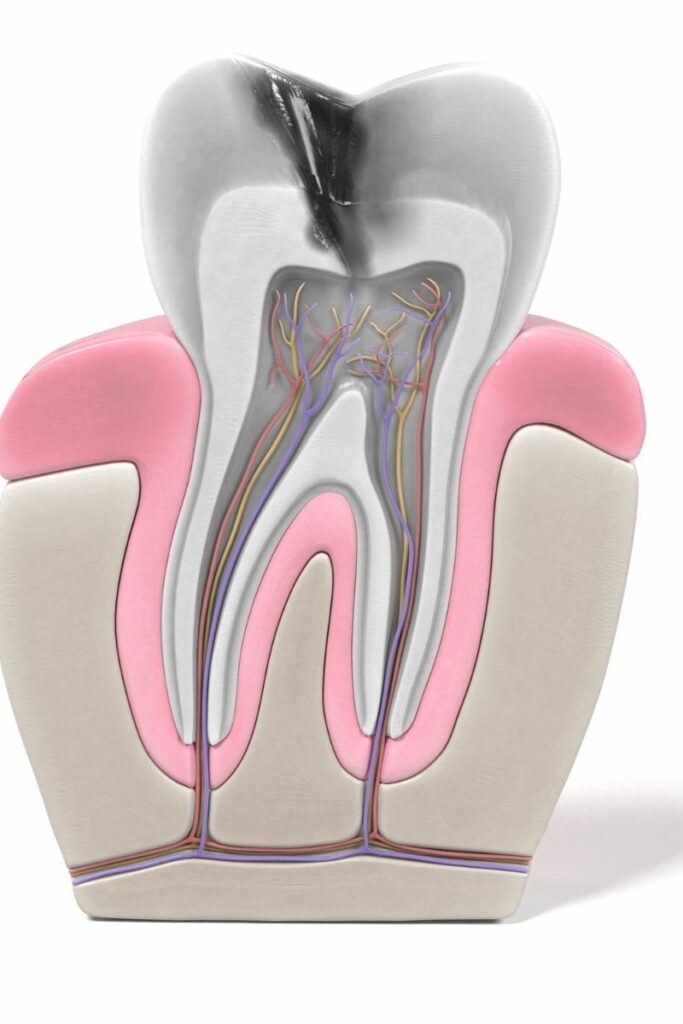Most Effective Home Remedy for Root Canal Pain
Experiencing intense root canal pain? The most effective home remedy for root canal pain outlined in this article (along with 8 other helpful remedies) can help ease your discomfort.

Disclaimer: This is not medical advice. Information and statements shown here are for educational and informational purposes only and are not to replace the advice of your healthcare professional.
This post may include affiliate links. Please refer to our disclaimer for full disclosure.
Understanding Root Canal Pain
What is Root Canal Therapy?
Root canal therapy, or a root canal procedure, is a dental treatment to save a tooth that is badly infected or decayed. Inside each tooth, there is soft tissue called the pulp, which contains blood vessels, nerves, and connective tissue. When the pulp gets infected due to tooth decay or injury, it can cause severe pain.
During a root canal procedure, the dentist removes the infected pulp, cleans the inside of the tooth, and then seals it to prevent further infection. This helps to save the tooth and maintain your oral health.

Why Does Root Canal Pain Occur?
After a root canal treatment, you might still feel pain. Here are some reasons why this happens:
- Inflammation: After the procedure, the soft tissue around the treated tooth can get inflamed. This inflammation causes swelling and throbbing pain.
- Infection: Sometimes, even after cleaning, some bacteria might remain, leading to a tooth infection. This can cause severe pain and swelling.
- Healing Process: As the tooth heals, it might be sensitive to cold temperatures or pressure. This is a normal part of the healing process.
Common symptoms after a root canal include:
- Swelling: The area around the treated tooth might swell.
- Sensitivity: The tooth can be sensitive to hot or cold foods and drinks.
- Throbbing Pain: You might feel a constant throbbing pain in the affected area.
Understanding these causes can help you find the best way to get root canal pain relief. Remember to follow your dentist's advice and practice good oral hygiene to support the healing process.
8 Home Remedies for Root Canal Pain
Saltwater Rinse
How to make it: Dissolve a teaspoon of salt in a glass of warm water.
Benefits: Reduces swelling and cleans the affected area. The saltwater rinse helps remove food particles and bacteria, promoting good oral health. This is also a great remedy for someone with strep throat or sore throat.
Cold Compress/Ice Pack
How to use: Apply to the painful area for 15-minute intervals.
Benefits: Numbs the pain and reduces swelling. Cold compresses can help constrict blood vessels, reducing inflammation in the affected area.
Herbal Remedies
Chamomile Compress
How to use: Soak a chamomile tea bag in warm water and apply to the affected area.
Benefits: Chamomile has anti-inflammatory properties that soothe pain and reduce swelling.
White Willow Bark
How to use: Make a paste with water and apply to the aching tooth.
Benefits: White willow bark is a natural pain reliever similar to aspirin and can help with severe pain.
Peppermint Tea Bags
How to use: Place a warm peppermint tea bag on the painful area.
Benefits: Soothes and reduces inflammation. The peppermint has natural antiseptic properties that can help with toothache pain.
Hydrogen Peroxide Rinse
How to use: Mix a hydrogen peroxide solution with equal parts water.
Benefits: Kills bacteria and reduces infection. This rinse acts as a natural disinfectant and can help keep the treated tooth clean.
Vanilla Extract
How to use: Apply a small amount to the aching tooth with a cotton swab.
Benefits: Vanilla extract is a natural antiseptic with soothing properties that can help reduce tooth pain.
Garlic
How to use: Place a fresh garlic clove on the infected tooth.
Benefits: Garlic acts as a natural antibiotic and pain reliever, helping to kill bacteria and alleviate pain.

Coconut Oil Pulling
How to use: Swish a tablespoon of coconut oil in your mouth for 10-15 minutes.
Benefits: Removes bacteria and promotes oral health. Oil pulling with coconut oil has antibacterial properties that can help keep the mouth clean.
Apple Cider Vinegar
How to use: Dilute with water and use as a rinse.
Benefits: Apple cider vinegar is a natural disinfectant and pain reliever, helping to reduce tooth infection and soothe the aching tooth.
These natural remedies can provide temporary relief from root canal pain. However, it’s important to follow up with your healthcare provider for appropriate treatment and to ensure the best results for your dental health.
The Most Effective Home Remedy for Root Canal Pain
One herbal home remedy that is really effective at relieving root canal pain is a clove oil compress. Clove oil is a natural pain reliever and has antibacterial properties that can help with tooth infection and inflammation.

How to Make a Clove Oil Compress:
- Materials Needed:
- Instructions:
- Mix a few drops of clove oil with a small amount of carrier oil. This helps to dilute the clove oil so it’s not too strong.
- Soak a cotton ball in the mixture.
- Place the cotton ball on the affected tooth or painful area.
Benefits of Clove Oil for Root Canal Pain
- Temporary Relief: Clove oil provides temporary relief from severe pain.
- Antibacterial Properties: It helps to kill bacteria, reducing the risk of further infection.
- Anti-inflammatory Properties: Clove oil helps to reduce swelling and inflammation.
Note: Always follow good oral hygiene and see your healthcare provider for appropriate treatment and professional dental care. This home remedy can help with temporary relief, but it’s important to address the underlying cause of the pain with your dentist.
Additional Tips for Root Canal Pain Relief
Good Oral Hygiene
Maintaining clean teeth and gums is very important to prevent further dental issues. Brush your teeth twice a day and floss daily to remove food particles and plaque. This helps keep your teeth healthy and can prevent gum disease and other dental problems.
Over-the-Counter Pain Relievers
Over-the-counter pain relievers, like ibuprofen or acetaminophen, can provide temporary relief from dental pain. Follow the instructions on the package for the correct dosage. These can help manage pain while waiting to see your healthcare provider.
Avoiding Certain Foods
Avoiding certain foods can help prevent worsening of tooth pain. Stay away from hard, sticky, or acidic foods, as they can irritate a painful tooth or sensitive teeth. Instead, choose soft foods that are easier to chew and less likely to cause pain.
Following these tips, along with using effective home remedies, can help manage root canal pain and improve your overall dental health. If pain persists, see a dentist for appropriate treatment options and professional dental care.

When to See a Dentist
Signs of Complications
Sometimes, home remedies aren't enough, and you need to see a dentist. Look out for these symptoms:
- Severe Pain: If the pain is intense and doesn't go away with home remedies or pain relievers.
- Fever: A fever can indicate an infection that needs professional treatment.
- Swelling: Swelling in your face, gums, or around the affected tooth might be a sign of a serious problem like a tooth abscess or root canal infection.
Importance of Follow-Up Appointments
After a root canal treatment, follow-up appointments with your dentist are crucial. They ensure that the healing process is on track and address any complications early. Your dentist can check for any signs of infection or other dental problems and provide appropriate treatment options to keep your oral health in good condition.
What is the best home remedy for root canal pain?
It depends on the individual's situation, but remedies like cold compresses and saltwater rinses are commonly effective. They help reduce swelling and provide temporary relief.
Can herbal remedies help with root canal pain?
Yes, herbal remedies like chamomile compresses and peppermint tea bags can provide relief. These natural remedies have anti-inflammatory properties that can soothe pain and reduce swelling.
How long does root canal pain last?
Pain typically subsides within a few days, but it can vary from person to person. If the pain persists, it’s important to consult your dentist.
When should I see a dentist after a root canal?
If pain persists for more than a few days or if there are signs of infection, such as severe pain, fever, or swelling, see a dentist immediately. It’s crucial to ensure the healing process is on track and to address any complications promptly.
Conclusion
Summary of Root Canal Remedies
Let's recap the most effective home remedies for root canal pain:
- Saltwater Rinse: Dissolve a teaspoon of salt in a glass of warm water to reduce swelling and clean the affected area.
- Cold Compress/Ice Pack: Apply to the painful area for 15-minute intervals to numb the pain and reduce swelling.
- Herbal Remedies:
- Chamomile Compress: Soak a chamomile tea bag in warm water and apply to the affected area for anti-inflammatory benefits.
- White Willow Bark: Make a paste with water and apply to the aching tooth for natural pain relief.
- Peppermint Tea Bags: Place a warm peppermint tea bag on the painful area to soothe and reduce inflammation.
- Hydrogen Peroxide Rinse: Mix a hydrogen peroxide solution with equal parts water to kill bacteria and reduce infection.
- Vanilla Extract: Apply a small amount to the aching tooth with a cotton swab for its natural antiseptic properties.
- Garlic: Place a fresh garlic clove on the infected tooth to act as a natural antibiotic and pain reliever.
- Coconut Oil Pulling: Swish a tablespoon of coconut oil in your mouth for 10-15 minutes to remove bacteria and promote oral health.
- Apple Cider Vinegar: Dilute with water and use as a rinse for its natural disinfectant and pain-relieving properties.
- Clove Oil: Apply a few drops of clove oil mixed with a carrier oil to a cotton ball and place it on the affected tooth for temporary relief from severe pain and its antibacterial properties.
These remedies can help ease your pain and support your recovery. By using natural ingredients with anti-inflammatory and antibacterial properties, you can reduce swelling, fight infection, and promote healing in the affected area.



